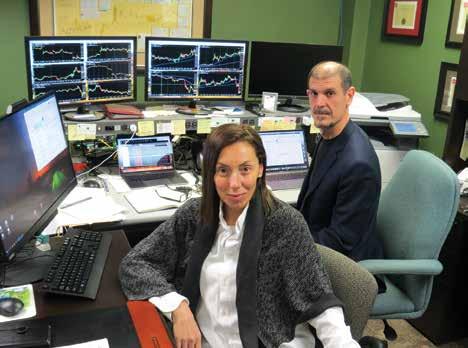
5 minute read
Tech Bytes: The Keys To Enabling The Tech Sector Of Windsor Essex
Beyond 2020: The Future Of Work And Learning By Dr. Victoria Abboud
It is no surprise the world of work has been changing. Rapidly.
Advertisement
This “fourth industrial revolution,” as it has been called by several futurists and economists, requires fast-paced learning, problem-solving, and adaptation. It seems like once we’ve gained skills in one area, it’s time to learn something completely new.
Pessimists often argue the way the world of work and learning is moving, this era will witness the demise of academic institutions, the complete shift of human workforces to robots, and the downfall of empathic humanity.
However, when we engage through the lenses of possibility, creativity, and systems thinking, it’s clear that much of this change can be influenced by humans learning and working at their best.
The “Tech Connect” initiative, first launched in July 2019, is a multi-pronged exploration of the Windsor Essex region that identifies our region’s prospective needs and trends, both in the workplace and in the community.
With the generous support of the Local Employment Planning Council led by Workforce WindsorEssex, WEtech Alliance endeavoured to create a snapshot of the regional “tech” scene and to question how the region might better connect employers and prospective employees.
We learned so much more than our leading question would suggest.
By interviewing community, business, and education leaders, hearing from college and university students, launching the Tech Connect survey, and facilitating the Information, Communication, and Technology (ICT) Roundtable, we were able to isolate some of the key opportunities that are most important for our region — the very opportunities that will support our region in the uncertain future of work and learning.
The keys to enabling our region to flourish in the future include: (1) intentional collaboration among business, education, and community; (2) identifying and supporting the evolving skill sets required of prospective employees; (3) opening young people to varied learning and career pathways; (4) supporting local businesses to create and foster fully inclusive work environments; and (5) opening the possibilities for broader-scale problem-solving and innovation across business, education, and community boundaries.
Although the rate at which change now happens is exponentially greater than for previous generations, the nature of work and learning engages us in ways that bring us to our full creative and intelligent selves.
By engaging as a community for our community, this region can adapt, grow, and flourish through this change. We have the capability if we move forward collectively.
For the full Tech Connect report, visit: WEtech-Alliance.com.
“Tech Bytes” is powered by WEtech Alliance (WEtech-Alliance.com) where Dr. Victoria Abboud is the Tech Talent Strategist. She is also a faculty member at the University of Windsor teaching technical communications and emerging technologies. As a researcher, educator, and administrator for two decades in Canada, the U.S., and Brazil, she has supported over 2,500 learners and 150 faculty to see the broadscale applications of their work and the vital importance of ethics and empathy in all they do.

portfolio corner Active Management Does Work
By Steven Mayo
The coronavirus — another crisis for the stock markets.
This is a crisis more of the unknown and a delay in business, supplies being stored instead of bought, and demand on hold. When the flow of people re-starts, the demand cycle will pick up.
As with any crisis, the fear of the unknown creates buying opportunities for the active manager. This is what I wait for. The list of great companies is already known.
As I write in early March, many great companies are now much cheaper to purchase.
In general, the stock markets have been hit hard because of a rush to liquidity (selling), and the heavy selling by ETFs and institutions of all sorts to build cash. It’s the fastest correction ever, and the fastest I’ve seen of a market place going from greed to fear since 2008 (which was justified).
So here we are. This too shall pass. It’s now time to reload your “buy list”. I recommend directing your hard earned money to where it is most welcome — The United States.
It has to be said that Canada’s government deters investment and innovations by more regulations and taxes, whereas the U.S. remains the best environment for business investment, innovation, technology, and medical advancement, and therefore growth and job creation.
By comparing our stock market sectors (and weightings) to the

S&P 500 you will see their investment sectors have more opportunity for future returns.
S&P/TSX 60 S&P 500
Financials 32.4% Information Technology 24.5% Energy 15.8% Health Care 14.1% Materials 11.2% Financials 12.0% Industrials 11.1% Communication Services 10.6% Information Technology 6.1% Consumer Discretionary 9.8% Communication Services 5.5% Industrials 8.8% Utilities 5.3% Consumer Staples 7.4% Consumer Staples 4.0% Energy 3.6% Consumer Discretionary 3.8% Utilities 3.6% Real Estate 3.7% Real Estate 3.1% Health Care 1.1% Materials 2.5% Source: RBC Dominion Securities, 3/2/2020
You will notice that the U.S. market is more representative of future growth industries, and less reliant on commodities.
You now have the perfect environment to diversify toward the U.S. economy.
There are two things I know for sure. First, interest rates will remain low, and second, quarterly earnings season begins in April.
Earning expectations have been lowered, and when companies start reporting, there is a good possibility the news is not as bad as expected. Today’s extreme headlines will have only provided excellent investment buying conditions. Twenty to 30% OFF SALES are rare!
I’ll wrap up this column now with a quote by U.S. President John F. Kennedy: “In the Chinese language, the word ‘crisis’ is composed of two characters, one representing danger and the other, opportunity.”
Steven Mayo is a Vice President, Director, and Investment Advisor with RBC Dominion Securities Inc. (Member — Canadian Investor Protection Fund). This article is not intended as nor does it constitute investment advice. Readers should consult a qualified professional before taking any action based on information in this article.













